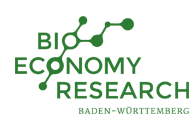Framework and requirements for "good governance" in the bioeconomy
The main objective of the project has been to comparatively analyze governance structures and implementation requirements of the bioeconomic resources lignocellulose and biogas. Bioeconomic structural change is driven by innovations that are intended to put both raw material generation and product and energy supply and conversion on a new basis. From that end we selected the following fields of innovation for this study:
- ‘Resources’: Miscanthus and short rotation plantations as renewable raw materials
- ‘Material use’: Bio-based products from lignocellulose
- ‘Energetic use’: Methanisation of biogas for power-to-gas technology
The analysis of these fields of innovation resulted in a multidimensional framework for topics and design options towards a good governance of the bioeconomy. It covers the fields of science and technology, policies and law, market and economy, ecology, and society. The broad spectrum of governance fields is reflected in the diversity of governance topics to be dealt with. These encompass, for example, the topics feasibility and efficiency, planning and regulation, market access and business models, climate protection and emissions, or participation and communication.
Overall, the study shows that good governance for bioeconomic innovations cannot only focus on their feasibility and usability, but also has to implement measures with regard to regulation, accountability and acceptance. A governance framework aiming at meeting these requirements combines the tasks of making bioeconomic innovations materialize, and guarantee this meets sustainability and social compatibility. Within this study, the framework conditions have been synthesized into modes of opportunities and limitations in order to ease a Good Governance for the Bioeconomy development.
| Project title | Bioeconomy as a socio-technical challenge: Framework and requirements for "Good Governance" |
| Institution | |
| Research group | Prof. Dr. Ortwin Renn, Dr. Dirk Scheer, Dr. Wilfried Konrad |
| Project status | completed |
